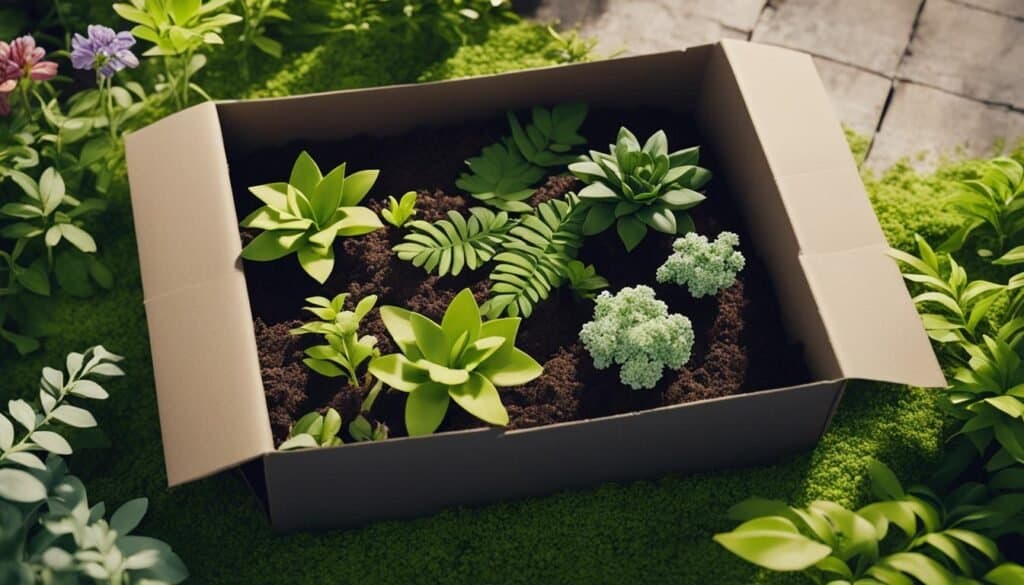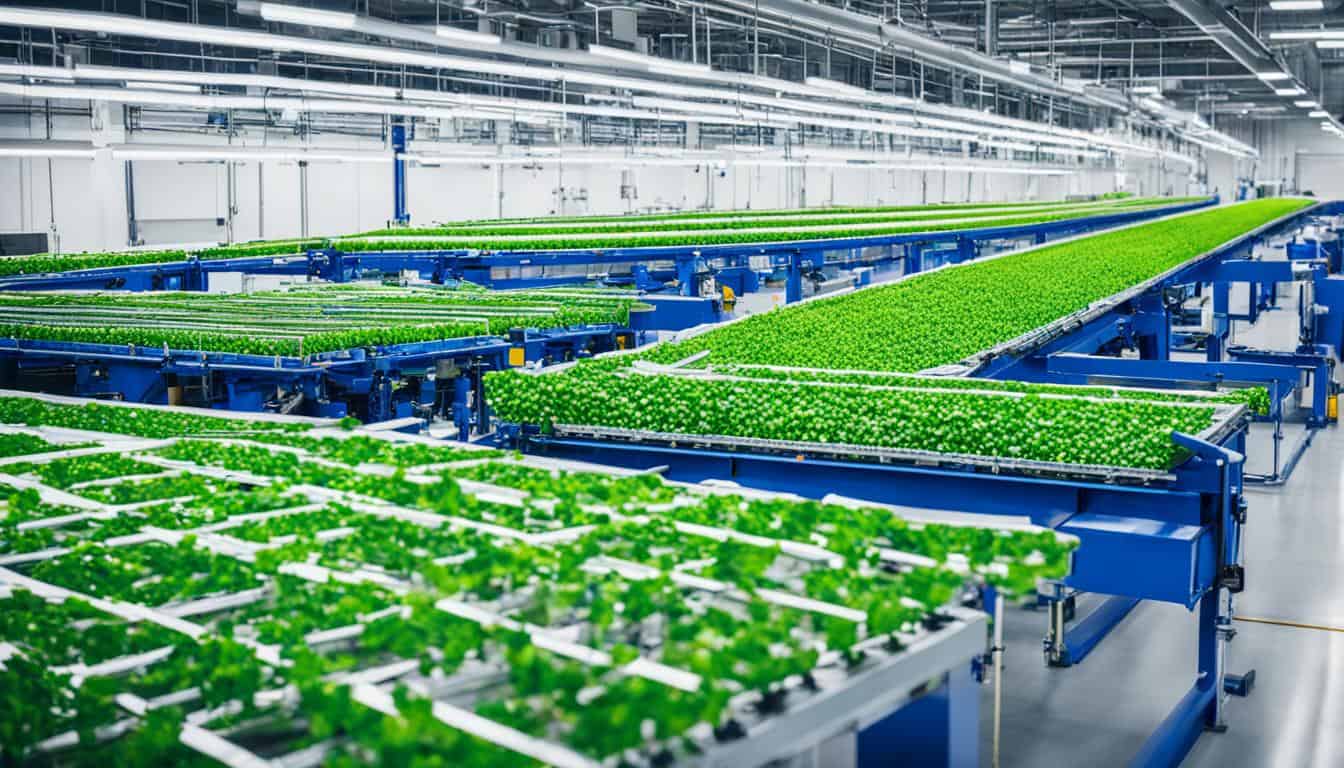As a society, we are increasingly becoming aware of the benefits of using biodegradable products to foster environmental preservation and personal health. By choosing to use these eco-friendly alternatives, we actively contribute to a more sustainable lifestyle and combat the pressing issue of plastic pollution. Biodegradable materials, such as biodegradable plastic, offer a viable solution to reduce reliance on traditional fossil fuel-based options and lower the carbon footprint of plastic production and waste.
The environmental benefits of biodegradable products extend far beyond the obvious advantages of landfill diversion and reduced greenhouse gas emissions. In fact, these materials have the potential to reshape our world in ways we’re only just beginning to comprehend. Let’s delve into the myriad of reasons why biodegradable products deserve a place in our daily lives.
Key Takeaways
- Biodegradable products offer numerous environmental benefits by decomposing naturally and preventing accumulation in landfills
- Switching to biodegradable alternatives is an effective way to reduce plastic pollution and promote eco-friendliness
- Biodegradable plastics are derived from renewable raw materials, helping to lessen dependency on fossil fuels
- Using biodegradable materials in everyday life demonstrates a commitment to sustainability and environmental stewardship
- Biodegradable products have wide-reaching applications in various industries, including packaging, healthcare, and technology
31 Benefits of Using Biodegradable Products
Here are 31 benefits of using biodegradable products, along with supporting statistics and tips:
1. Reduce Waste and Landfill Use
Using biodegradable products can significantly reduce waste and landfill use. Over 90% of plastic packaging goes into landfills. Since biodegradable plastics break down much faster, they reduce long-term landfill accumulation.
Tip: Look for the term “biodegradable” on product labels to choose better options.
2. Lower Carbon Emissions
Biodegradable plastics emit much less carbon during production compared to traditional plastics – nearly 4 times less. This greatly reduces environmental impact.
Tip: Opt for plant-based biodegradable plastics when possible as they utilize existing CO2 during growth.
3. Promote Circular Economy
Biodegradable products use renewable materials and can be composted at end-of-life, promoting circularity. This means less new plastic needs to be produced over time.
Tip: Properly compost biodegradable items after use instead of sending them to landfills.
4. Reduce Plastic Pollution
Plastics make up 13% of waste, which ends up polluting land and oceans. Biodegradable alternatives directly address this issue by breaking down faster.
Tip: Switch from conventional plastic items to biodegradable versions whenever possible.
5. Save Space in Landfills
Since biodegradable materials decompose quicker, they save space in landfills for other waste that may not have alternatives. This saves land over time.
Tip: Support bans on sending biodegradable waste to landfills to maximize space savings.
6. Safer for Environment
Biodegradable materials break down into benign natural substances, unlike traditional plastics. This makes them much safer for the environment long-term.
Tip: Verify certifications on biodegradable products to ensure they are safe for the environment.
7. Reduce Reliance on Fossil Fuels
Most plastics today are made from fossil fuels. Biodegradable alternatives utilize renewable plant-based materials, reducing non-renewable resource consumption.
Tip: Choose plant-based compostable bioplastics over plastic alternatives.
8. Mitigate Climate Change
The production of biodegradable plastics emits fewer greenhouse gases than traditional plastics. This difference is amplified by biodegradation instead of persisting in the environment. Their use helps mitigate climate change.
Tip: Opt for biodegradable or compostable packaging for shipping and food.
9. Safer for Humans
Biodegradable materials are often made from natural substances rather than chemicals, making them less toxic and allergenic. This makes them safer for human contact and consumption.
Tip: Use biodegradable products for food packaging and handling.
10. Promote Sustainable Brand Image
A 2021 survey found 73% of consumers expect companies to have sustainability goals. Using biodegradable products enables brands to meet this demand and promote sustainability.
Tip: Advertise the use of biodegradable materials to consumers.
11. Save Money Long-Term
Though biodegradable materials can cost more upfront, they provide savings by reducing waste management and environmental impact costs over decades.
Tip: Factor in long-term savings when purchasing biodegradables.
12. Meet Environmental Regulations
Many governments worldwide are planning to implement stronger regulations around plastic waste and biodegradability requirements. Shifting to biodegradables helps meet these goals.
Tip: Stay updated on upcoming regulations in your jurisdiction.
13. Attract Investors and Partners
Sustainable businesses attract more investors and partners compared to conventional companies. Using biodegradable products helps demonstrate social responsibility.
Tip: Publish annual sustainability reports showcasing biodegradability improvements.
14. Satisfy Eco-Conscious Consumers
73% of consumers expect companies to have sustainability goals. Using biodegradables helps meet this demand from environmentally-conscious consumers.
Tip: Train sales staff to answer queries about biodegradable credentials.
15. Support Eco-Friendly Lifestyle
Biodegradable products enable environmentally-conscious consumers to live more sustainably day-to-day. This lifestyle shift is a growing trend.
Tip: Offer biodegradable alternatives for common everyday plastic items.
16. Produce Less Microplastics
As plastics break down over decades they produce microplastics, which enter food chains. Faster breakdown of biodegradables prevents this.
Tip: Encourage proper composting of biodegradables to eliminate microplastic production.
17. Protect Wildlife and Marine Life
Plastics ingested by wildlife and aquatic life injure and kill them. Using biodegradables instead prevents this plastic pollution threat.
Tip: Follow wildlife-safe disposal protocols for biodegradable materials.
18. Preserve Natural Environments
Plastic waste litters nature and harms plants over time. Biodegradables avoid preserving pristine natural environments long-term compared to plastics.
Tip: Use biodegradable camping and picnic supplies to leave no trace.
19. Enable Organic Waste Diversion
Most food and yard waste ends up in landfills, producing methane. Compostable biodegradable packaging enables diversion to industrial compost instead.
Tip: Establish organic waste collection for compostables in your municipality.
20. Reduce Waste Collection Costs
Organic waste is heavy, and transportation for disposal is expensive. Diverting organics like food and compostable packaging to compost facilities saves municipalities collection and tipping fees.
Tip: Invest in centralized composting facilities to reduce transport costs.
21. Create Nutrient-Rich Fertilizer
Composting biodegradable food packaging results in nutrient-rich fertilizers for farms and gardens. This achieves circularity for the nutrients.
Tip: Use compost produced from biodegradables to grow food crops or landscaping.
22. Enable Water Conservation
Compost produced from biodegradables increases soil health, which boosts water retention compared to using chemical fertilizers19. This enables water conservation.
Tip: Use compost on gardens, landscaping, and farms to reduce water usage.
23. Grow the Green Economy
The biodegradable plastics market is forecast to grow at a CAGR of 9.2% from 2023-2030 to reach $23.3 billion globally. This emerging subset boosts green industry.
Tip: Source biodegradable materials from eco-conscious suppliers.
24. Create Jobs
The biodegradable plastics industry employs people in roles such as R&D, manufacturing, sales and marketing across the supply chain. Market growth will drive additional job creation.
Tip: Seek employment or invest in the biodegradables industry.
25. Drive Innovation
Rising demand for biodegradables drives research and innovation to develop improved products and materials. This benefits the green technology space.
Tip: Provide grants and investments in biodegradable startups.
26. Increase Renewable Material Production
More biodegradables means increased farming of renewable feedstocks like hemp, starch and cellulose. This transition supports the renewable materials industry.
Tip: Partner with agricultural producers to ensure ample renewable inputs.
27. Achieve Corporate Sustainability Goals
Many corporations have set sustainability targets around carbon emissions, waste, recyclability and renewable material use. Adopting biodegradables helps achieve these commitments.
Tip: Audit company products and packaging to identify biodegradable transition opportunities.
28. Enhance Brand Reputation
Consumers have a far more favorable impression of brands with strong sustainability practices. Using biodegradable products enhances brand reputation amongst eco-conscious consumers.
Tip: Proactively communicate sustainability efforts to consumers.
29. Meet Customer Demand
73% of consumers expect companies to have sustainability goals. Using biodegradables helps brands respond proactively to customer expectations and demand.
Tip: Train staff to educate consumers about biodegradability commitments.
30. Comply With Regulations
Governments worldwide are planning to ban certain single-use plastics and mandate recyclability/biodegradability. Proactively switching to biodegradable alternatives helps comply with these policy changes.
Tip: Consult policy watchdogs to stay updated on upcoming regulations.
31. Demonstrate Corporate Responsibility
Using biodegradables showcases social and environmental responsibility to shareholders, investors, partners, customers and staff. This strengthens corporate reputation and attractiveness.
Tip: Publish annual sustainability reports detailing biodegradability improvements.
Introduction to Biodegradable Innovations in Everyday Life
In recent years, there has been a noticeable shift towards the use of biodegradable materials in daily life, extending from household items to advanced technologies. These materials, often sourced from natural plant-based raw materials, provide an opportunity to compost and recycle products, reducing waste. By using biodegradable products, consumers not only take a step towards reducing pollution but also promote ecological conservation and stewardship.
Some notable examples of everyday items that now incorporate biodegradable materials include:
- Biodegradable bags: used for grocery shopping or packaging
- Disposable cutlery: made from cornstarch or other plant-based materials
- Cleaning products: featuring biodegradable packaging and eco-friendly ingredients
- Biodegradable diapers: created with plant-based materials and decompose much faster than traditional diapers
Below is a summary of the advantages of using biodegradable materials in everyday applications:
| Attribute | Advantages of Using Biodegradable Materials |
|---|---|
| Compostability | Biodegradation occurs under specific conditions, enabling materials to break down into beneficial components like water, carbon dioxide, and organic matter through composting. |
| Recyclability | Many biodegradable materials can be recycled, contributing to less waste production and supporting the circular economy concept. |
| Reduced Carbon Footprint | Using biodegradable materials often yields a lower carbon footprint compared to traditional materials, as some are derived from renewable sources or require less energy for production. |
| Environmental Stewardship | Adopting products made of biodegradable materials signals a commitment to preserving the environment and reducing pollution. |
Transitioning towards using biodegradable products offers a multitude of benefits. As more and more manufacturers embrace biodegradable materials, consumers can contribute to the movement by consciously choosing products with an eco-friendly focus.
Sciencing discusses the potential for biodegradable plastics to help reduce the massive amounts of plastic waste in landfills, as these materials are designed to break down much faster under the right conditions.
This shift will help drive the demand for sustainable solutions and impact future technological advancements. By choosing items made from biodegradable materials, you can actively participate in preserving the planet for future generations.
Benefits of Using Biodegradable Products
Biodegradable products offer a plethora of advantages in various aspects, including making a positive impact on the environment, enhancing public health and safety, driving advancements in biodegradable materials and technologies, and fostering a sustainable circular economy. Let’s delve deeper into each of these benefits to better understand how biodegradable products contribute to a better future.
A Positive Impact on the Environment
One of the primary benefits of using biodegradable products is their reduction in pollution. Biodegradable materials break down naturally when discarded, and are absorbed by the soil, enriching it and preventing contamination. This process lowers the need for landfills and reduces the emission of harmful gases. On the contrary, non-biodegradable plastic can persist for centuries, causing severe pollution. The use of biodegradable alternatives signifies active participation in conservation and protection efforts.
Enhancing Public Health and Safety
Biodegradable plastics contribute to better public health and safety by reducing exposure to harmful chemicals often associated with conventional plastics. These eco-friendly alternatives are made from renewable and natural materials, which do not leach toxins into food or the natural environment. This supports overall sanitation, hygiene, and wellbeing, as well as detoxification and neutralization of harmful substances.
Advancements in Biodegradable Materials and Technologies
Progress in biodegradable technologies has led to innovative materials that can match the performance of traditional plastics. Scientists have unlocked methods to craft polymers from biomass-based, biodegradable raw materials, merging environmental responsibility with technological performance. These advancements in bioplastics and biopolymers underscore the potential for a significant shift in manufacturing processes, making use of renewable raw materials, innovation, and bio-based materials.
Fostering a Sustainable Circular Economy
Another benefit of using biodegradable products is their ability to promote a sustainable circular economy, which focuses on recycling, reprocessing, and regeneration. This model aims to use food processing waste for creating biodegradable packaging, pushing the boundaries of resource conservation.
These eco-friendly packaging solutions are designed to compete with traditional plastics, yet offer the added advantage of being part of a responsible recycling and reprocessing regime, all the while contributing to the regeneration of natural resources.
Biodegradable products offer a wide range of advantages over traditional plastics, including a positive environmental impact and improved public health and safety. The advancements in biodegradable materials and technologies, combined with their role in fostering a sustainable circular economy, make them an essential part of our efforts towards a more sustainable future.
Sustainable Packaging Solutions from Food Waste to Usage

Innovative projects like the USABLE PACKAGING project are at the forefront of providing sustainable packaging solutions by harnessing the potential of food waste. This groundbreaking initiative converts food processing byproducts into compostable and biodegradable packaging products. Not only do these materials showcase technical properties on par with traditional plastics, but they also emphasize the importance of organic and biotech recycling solutions. This project signals a much-needed shift towards comprehensive sustainability from production to disposal.
By making use of food waste, sustainable packaging solutions steer us towards a greener future, where waste management and recycling are integral.
A comparative analysis of biodegradable and traditional packaging materials demonstrates the impact of sustainable packaging solutions on reducing waste and carbon emissions. See the table below for a concise overview:
| Material | Recyclability | Compostability | Waste Management | Carbon Emissions |
|---|---|---|---|---|
| Biodegradable Packaging | Yes | Yes | Highly effective | Lower |
| Traditional Plastic Packaging | Yes (limited) | No | Less effective | Higher |
Transitioning towards more sustainable packaging solutions promotes responsible waste management practices. Utilizing food processing byproducts as raw materials minimizes the strain on landfills and contributes to a reduction in greenhouse gas emissions. These eco-friendly, biodegradable packaging products are a testament to the fact that innovation and sustainability can go hand in hand, paving the way for a healthier planet.
Transformative Biodegradable Materials in Healthcare and Electronics
Biodegradable materials have transformed industries by pioneering sustainable solutions in healthcare and electronics. Both sectors are embracing these innovations to create cutting-edge solutions and reduce their environmental footprint. In this section, we will explore the development and use of biodegradable sensors, sustainable electronics, and biodegradable medical devices.
Pioneering Biodegradable Sensors for Health Monitoring
The healthcare sector is utilizing biodegradable sensors These state-of-the-art devices are designed to naturally degrade after use, eliminating the need for removal surgeries and offering a sustainable answer to rising electronic and medical waste. By employing these sensors, real-time monitoring of physiological parameters is achieved, promoting advanced diagnostic techniques and individualized treatment.
The Transition to Sustainable Electronics and its Global Impact
The adoption of sustainable electronics is poised to have a remarkable global impact. These biodegradable materials assist in curtailing the electronic waste crisis by decomposing at the end of their lifecycle, offering an eco-friendly alternative with lessened carbon footprint. The transition to these materials has the potential to dramatically reduce electronic waste and contribute to a more environmentally conscious society.
Biodegradable Devices in Medical Applications
Fully biodegradable medical devices mark a significant shift in medical practice. Created from materials that ensure biocompatibility and biodegradability, these devices serve as temporary implants that dissolve, obviating the need for surgical removal and cutting down on medical waste. The development of these devices embodies the intersection of medical excellence and environmental stewardship.
Biodegradable materials are revolutionizing various industries by introducing sustainable solutions that minimize our environmental impact and push the boundaries of innovation.
From sensors to medical devices, the adoption and integration of these biodegradable materials into various sectors is paving the way for a sustainable future. By embracing these innovations, we can reduce our overall carbon footprint, combat electronic waste, and promote healthier living through sustainable healthcare technologies.
Circular Economy and Corporate Commitment to Biodegradability
The growing trend of incorporating sustainability principles in business practices has led to the adoption of circular economy practices such as recycling and reuse, particularly when it comes to plastic waste. Corporations like LyondellBasell have made significant strides in integrating Post Consumer Resin (PCR) into their manufacturing processes to address packaging sustainability and circularity challenges. Through these efforts, the entire supply chain is being transformed to become more environmentally friendly.
Integrating Post Consumer Resin (PCR) in Manufacturing
PCR is being embraced as a key component in manufacturing as it reduces the environmental impact and diverts plastic waste from landfills. By harnessing recycled materials and incorporating them into new, innovative products, businesses can create practical applications and promote a lasting circular value chain.
LyondellBasell’s Circulen Family for Sustainable Solutions
LyondellBasell’s Circulen product portfolio showcases the company’s dedication to crafting sustainable solutions. The CirculenRecover, CirculenRenew, and CirculenRevive ranges utilize materials sourced from renewable sources, fostering a comprehensive circular economy approach. These ranges epitomize mechanical recycling and advanced recycling solutions, paving the way for a greener future in packaging and manufacturing.
Global Certifications Ensuring Supply Chain Integrity
Supply chain integrity is essential in maintaining the credibility and efficacy of sustainable practices. For this reason, LyondellBasell has opted to acquire third-party ISCC PLUS certification for its Circulen products. This certification guarantees traceability and ensures prestigious global standards are met, thus validating the mass balance approach in production. As a result, consumers can be confident in the environmental credentials of LyondellBasell’s offerings.
In summary, corporate commitment to sustainability and circular economy practices play a significant role in creating a positive environmental impact. By incorporating Post Consumer Resin into manufacturing processes and adhering to global certifications, companies like LyondellBasell are paving the way for a greener, more sustainable future.
Conclusion on Benefits of Using Biodegradable Products
In the pursuit of accountability and responsibility, the adoption of biodegradable products is integral to environmental stewardship. By recognizing the benefits these products bring to our environment and health, we can contribute to ongoing global efforts of conservation, preservation, and restoration. Biodegradable plastics, in particular, have a direct and significant impact on the environment, helping us transition towards a more sustainable and circular economy.
The diverse applications of biodegradable materials, from sustainable food packaging to cutting-edge healthcare technologies, highlight the transformative power of these innovations. As sustainable alternatives to traditional plastic products, the use of biodegradable materials in various industries continues to evolve. This momentum not only supports our mission to protect and preserve the planet but also ensures a cleaner, safer future for all.
With an emphasis on environmental stewardship and ecological impact, the journey towards a revitalized and balanced ecosystem forges ahead. By embracing biodegradable materials and practices, we play an active role in shaping a world where conservation, preservation, and restoration remain at the forefront of our efforts. Together, we can create lasting change for this generation and the ones to come.
FAQ on Advantages of Using Biodegradable Plastics
Q: What are the advantages of using biodegradable products?
A: Biodegradable products help reduce the emission of greenhouse gases, promote the use of renewable resources, and reduce our dependence on petroleum-based products.
Q: What are biodegradable plastics made from?
A: Biodegradable plastics are made from natural materials such as cornstarch, pea starch, or plant-based oils.
Q: How do biodegradable plastics compare to traditional plastic?
A: Biodegradable plastics decompose much faster than traditional plastics, reducing the amount of plastic waste in the environment.
Q: What are the disadvantages of using biodegradable products?
A: Some disadvantages of biodegradable products include higher production costs, limited shelf life, and the need for specific conditions for degradation.
Q: How do biodegradable plastics benefit the environment?
A: Biodegradable plastics produce fewer greenhouse gas emissions and require fewer natural resources compared to traditional plastics, making them environmentally friendly.
Q: What are the advantages and disadvantages of using biodegradable packaging?
A: The advantages of biodegradable packaging include reduced environmental impact and lower carbon footprint, while the disadvantages include higher production costs and limited durability.
Q: Can biodegradable plastics decompose in natural environments?
A: Yes, biodegradable plastics can decompose in natural environments, but the process may vary depending on the specific type of plastic and environmental conditions.
Q: What are the benefits of using biodegradable plastic products?
A: The benefits of using biodegradable plastic products include reducing plastic pollution, conserving natural resources, and minimizing the environmental impact of plastic waste.
Q: How are biodegradable plastics different from bioplastics?
A: Biodegradable plastics are a type of bioplastic that can decompose over time, while bioplastics are made from renewable resources such as plant-based materials.
Q: What is the use of biodegradable plastics in today’s context?
A: Biodegradable plastics are increasingly used in various applications including food packaging, disposable cutlery, and agricultural mulch films due to their eco-friendly nature and potential to reduce environmental pollution.





Leave a Reply